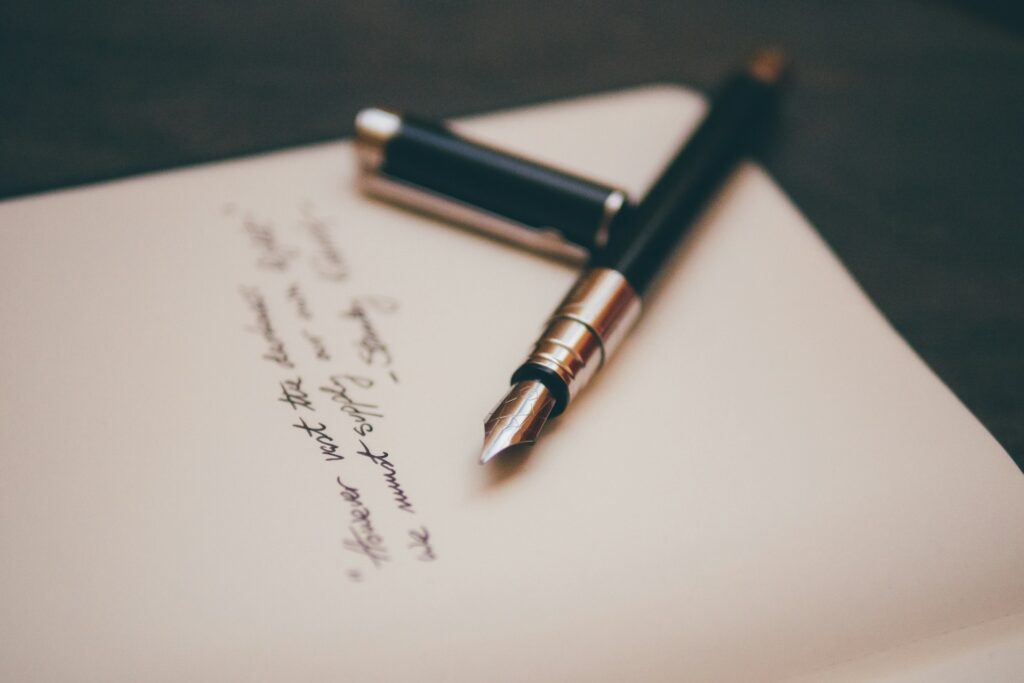Let’s be real—journaling hasn’t always been marketed to men. It’s often seen as a quiet, emotional, even “soft” practice, one that doesn’t quite align with the rugged image that’s traditionally attached to masculinity. But let’s flip that script. Journaling isn’t about being soft—it’s about being sharp. It’s a tool. Like a wrench for your thoughts or a gym for your mind. Men need clarity, control, and composure, especially in a fast-paced, chaotic world. And journaling delivers just that.
The stigma that journaling is only for women or creatives is outdated and frankly, unhelpful. Men from all walks of life—CEOs, athletes, military veterans, and even monks—use journaling to navigate challenges, make critical decisions, and stay centered. It’s a practice rooted in self-awareness, strategy, and strength—not sentimentality.
So, if you’re a guy wondering whether journaling is “for you,” stop wondering. It’s not about fitting a mold. It’s about breaking your own limitations and mastering your mindset. That’s not just manly—it’s powerful.
Why Men Need Journaling More Than Ever
In today’s world, men are pulled in a hundred directions—career pressure, family responsibilities, social expectations, and the unspoken demand to always “have it together.” The truth? Nobody has it all figured out. But journaling can help you get damn close.
Journaling offers a private space to slow down and think. To process, plan, and grow. It’s where you go to get clear when everything else is noisy. Whether you’re chasing a promotion, dealing with emotional baggage, or just trying to be a better partner, father, or friend, journaling gives you the mental real estate to work things out.
And unlike therapy or coaching, journaling doesn’t cost a dime and it’s always available. It’s your own personal compass in the chaos. In a world full of distractions and shallow connections, journaling helps you connect with the most important person—yourself.
The Benefits of Daily Journaling for Men

Mental Clarity and Emotional Balance
Ever feel like your mind is racing with a million thoughts and you can’t catch a break? That’s mental clutter, and it’s exhausting. Journaling helps you dump those thoughts onto paper, which clears space for deeper focus and better thinking. Think of it like clearing out the cache on your computer—it runs faster and smoother.
But there’s another layer to this. Journaling helps you balance your emotions. Instead of suppressing your stress, anger, or frustration, you give it a safe outlet. That’s not weakness—it’s wisdom. Emotional awareness makes you stronger, not softer. And when you start journaling consistently, you’ll notice it becomes easier to handle tough conversations, setbacks, and even conflicts because your mind isn’t overloaded anymore.
In short, clarity gives you power. And journaling is how you get it.
Improved Decision-Making and Productivity
Your brain wasn’t built to store everything. Yet, we try to hold onto tasks, ideas, worries, goals—all at once. The result? Overwhelm and decision fatigue.
When you journal daily, you externalize your thoughts. You turn mental clutter into concrete ideas. That makes it easier to prioritize what actually matters. You start to notice patterns—what’s working, what’s not, and what needs to go.
Plus, journaling forces you to slow down and reflect. And reflection is where real growth happens. You can assess yesterday’s wins and losses, and set clear intentions for today. That means you stop reacting to life and start responding with purpose.
Productivity isn’t about doing more. It’s about doing the right things with clarity. Journaling helps you spot the right things faster.
Stress Reduction and Self-Awareness
Men are taught to “man up” and “power through” stress. But let’s be honest—bottling it up only leads to burnout, explosions, or worse, numbness. Journaling gives that stress a release valve. It’s like exhaling after holding your breath all day.
When you put your thoughts and emotions on paper, you can actually see them for what they are—not what your anxiety makes them out to be. That’s a game changer. Suddenly, that problem you thought was a mountain looks more like a molehill.
Even better, journaling increases your self-awareness. You start recognizing triggers, habits, and tendencies. You begin to catch yourself before you spiral, self-sabotage, or make the same mistake again.
In a nutshell: stress goes down, self-mastery goes up. That’s a trade worth making.
Common Misconceptions About Journaling

Journaling is Not Just for Writers or Artists
One of the biggest myths about journaling is that it’s some kind of poetic ritual reserved for the Shakespeare-wannabes and watercolor enthusiasts. Wrong.
You don’t have to be a writer. You don’t even need good handwriting. Journaling isn’t about art—it’s about insight. You’re not writing for an audience; you’re writing for yourself. And guess what? Your journal doesn’t care if your sentences are run-ons or your spelling is off. It just wants honesty.
Some of the most impactful journal entries are bullet points, single sentences, or even scattered thoughts. It’s not about how it looks—it’s about what it gives you.
It’s Not a “Dear Diary” Practice
Let’s kill another cliché: journaling doesn’t have to start with “Dear Diary.” You’re not here to narrate your day like a teenage soap opera.
Think of journaling as a strategic tool, not a melodramatic recap. You can use prompts, questions, goals, or even lists. You can brainstorm, reflect, analyze, or vent. There’s no right or wrong—just progress.
Journaling is more like mental weightlifting than emotional venting. It strengthens your thinking, your self-control, and your inner game.
You Don’t Need to Write Pages
Another myth? That journaling has to take 30+ minutes and cover your whole life story. Nope.
Sometimes, one paragraph is all it takes to unlock a breakthrough. Other days, you might go longer. But consistency beats length. Even a quick check-in each day can build momentum and mental sharpness.
Start with five minutes. Use a prompt. Or answer one question: “What’s on my mind right now?” Keep it simple. Let it grow naturally.
Setting Up Your Daily Journaling Practice

Choosing the Right Journal and Tools
The right journal can make a big difference. Do you prefer a classic leather-bound notebook, a digital app like Evernote, or a simple spiral notepad? There’s no one-size-fits-all answer.
The key is choosing what feels good to use. If you love writing with a certain pen or typing on your favorite app, great. If you like voice-to-text journaling while driving to work, go for it. Your tools should make the process smooth and enjoyable.
Consider whether you want a guided journal with prompts or a blank slate. Some men prefer structured templates to get started—others thrive with total freedom. Test both and see what sticks.
Don’t overthink the tools. What matters most is consistency, not perfection.
Creating a Comfortable Space for Reflection
You don’t need a meditation cave or a candle-lit desk to journal—but a quiet, undistracted space helps. Find a corner in your home, a spot in your car, or even a cozy chair at the coffee shop.
Make it a place where your brain can exhale. Turn off notifications. Grab a coffee. Keep your phone on silent. Make journaling feel like a pause, not a task.
Over time, your brain will start associating that space with clarity. It becomes your mental gym. Your mind shows up, ready to reflect.
The Daily Framework for Men’s Journaling

Morning Mind Dump – Clearing the Mental Clutter
Let’s face it—most of us wake up with our minds already racing. Thoughts from yesterday, worries about today, random to-dos, unfinished conversations—all fighting for attention before your feet even hit the floor. That’s where the Morning Mind Dump comes in. It’s the perfect way to declutter your head and start the day with a clean slate.
So, what exactly is a mind dump? Think of it like taking out the mental trash. You grab your journal and write down everything that’s swirling around in your head. No filter. No judgment. Just write. Bullet points, messy sentences, scattered ideas—it doesn’t matter. The goal is to get it out of your head and onto paper.
This simple habit gives you mental breathing room. It clears the fog, sharpens your focus, and sets you up to actually respond to the day, instead of reacting to it. You’ll notice that your mood improves, your priorities become clearer, and your productivity gets a boost—all from taking 5-10 minutes to offload your mental load.
Here are a few prompts to get started:
- What’s taking up space in my mind right now?
- What am I worried about?
- What do I need to get done today?
Doing this daily can seriously transform your mornings from chaotic to intentional. And over time, you’ll start to see patterns in your thoughts—what keeps coming up, what you’re avoiding, and where you might need to make changes.
So grab that pen, open that journal, and dump those thoughts. Your mind will thank you for it.
Midday Reflection – Re-centering and Refocusing
By midday, it’s easy to feel like you’ve lost track. You start your morning strong, but somewhere between back-to-back meetings, emails, and everything life throws at you, your focus slips. That’s exactly why a Midday Reflection is so powerful—it helps you pause, re-center, and get back on track.
You don’t need a 30-minute break or a fancy ritual. Just 5-10 minutes with your journal around lunchtime can reset your mental energy. It’s your chance to take a breath, assess your progress, and realign with your goals.
Ask yourself:
- What have I accomplished so far today?
- What has distracted me?
- What do I need to focus on for the rest of the day?
This quick check-in can prevent the afternoon slump. It keeps your priorities top of mind and helps you pivot if the day hasn’t gone as planned. Instead of spiraling into frustration, you reclaim control of your schedule and your mindset.
You can also use this time to jot down new ideas, take note of something that inspired you, or write about a challenge you’re currently facing. Think of it as a tactical huddle with yourself—honest, brief, and effective.
Midday journaling isn’t just a productivity hack—it’s a performance enhancer. It brings mindfulness into a hectic day and reminds you that you’re not just surviving the day, you’re leading it.
Evening Summary – Lessons Learned and Wins of the Day
Evenings are for winding down, but also for reflection. A powerful journaling practice to end your day is the Evening Summary. This is where growth really happens. It’s your chance to look back, connect the dots, and prepare for tomorrow with insight, not anxiety.
You don’t need to write an essay. Just answer a few simple but powerful questions:
- What did I learn today?
- What went well?
- What could I do better tomorrow?
This reflection helps you extract lessons from your experiences—big or small. It turns your day into data. Instead of just reacting to life, you begin to analyze it and use that feedback to evolve.
Another great addition to your evening journal is a gratitude list. Write down 1-3 things you’re grateful for. This small shift in focus rewires your brain to look for positives, even on tough days. It improves sleep, boosts mood, and builds resilience.
Ending your day with a journal entry is like setting your mind to rest mode. You offload the stress, capture the wisdom, and go to bed with peace, not pressure.
Building Journaling into a Sustainable Habit

Start Small and Stay Consistent
You don’t need to go all-in on day one. In fact, trying to write like Hemingway every day is the fastest way to burn out. Journaling is a long game, and the key to success is consistency—not volume.
Start with just five minutes a day. Choose one journaling time (morning, midday, or evening) and commit to showing up consistently. Once it becomes second nature, you can expand from there. The goal is to build momentum, not perfection.
Set a realistic schedule. Even three days a week is a great start. Keep your journal visible—on your nightstand, desk, or in your backpack. Use reminders or habit trackers if needed. The easier it is to start, the more likely you’ll stick with it.
Consistency builds results. Like working out, journaling doesn’t give you six-pack abs overnight—but it will shape your mindset, boost clarity, and change your game over time.
Create Personal Prompts That Matter
Prompts are great tools to guide your journaling when you don’t know what to write. While you can use generic ones like “What am I grateful for?” or “What did I learn today?”, creating your own personal prompts makes the process even more effective.
Think about the areas of life where you want growth—leadership, relationships, self-confidence, productivity. Then create questions that make you dig deeper.
Here are some examples:
- What would my best self do today?
- What’s the one thing I’m avoiding?
- What habit is helping or hurting my progress?
- What am I doing that aligns with my values?
You can rotate through a different question each day or stick to one prompt for a week. Make them as raw or tactical as you want. The more personal your questions, the more valuable your answers will be.
Custom prompts keep your journaling fresh and aligned with your goals. They also prevent it from feeling like a chore. When your journal feels like a place of exploration—not repetition—you’ll naturally keep coming back to it.
Journaling Formats That Work for Men

Bullet Journals for Quick Clarity
Bullet journaling is ideal for guys who like structure and efficiency. Instead of long paragraphs, you use short, punchy bullet points to track thoughts, goals, habits, and ideas.
It can be as simple or complex as you like. Some guys use symbols like:
- “•” for a task
- “–” for notes
- “x” for completed items
- “>” for tasks to move forward
Others use sections for daily logs, habit tracking, gratitude, and even goal breakdowns.
The biggest benefit? It’s fast. You can knock out a whole journaling session in just five minutes—and still walk away with massive mental clarity.
Bullet journals are also highly customizable. If you love notebooks, pens, and organizing systems, this format might be your jam.
Stream of Consciousness Writing
This style is raw and real. You simply write whatever comes to mind—no filter, no grammar rules, no structure. Just go. It’s ideal for emotional processing or getting “unstuck” mentally.
Set a timer (5-10 minutes), put pen to paper, and write without stopping. Don’t worry about making sense. The goal is to empty your head and connect with what’s under the surface.
Men who carry a lot emotionally—anger, confusion, doubt—often find this method liberating. It’s like a brain detox. You spill everything out, then walk away lighter.
Stream-of-consciousness writing helps you get past your logical brain and tap into what’s really going on underneath. It’s messy, but effective.
Guided Journals with Prompts
If you’re new to journaling or prefer a little structure, guided journals are a great place to start. These come with daily prompts, templates, or even themes around topics like mindset, gratitude, or goal-setting.
They take the guesswork out of what to write and help build consistency. Many men find them useful as a warm-up into deeper, more personal journaling habits.
Popular guided journals like “The Five Minute Journal” or “The Daily Stoic” are often designed with high-achievers in mind—offering short, impactful prompts that don’t feel fluffy.
The best part? You can always add your own thoughts after finishing the prompt. It’s a great hybrid approach—structure meets spontaneity.
Using Journaling to Track Goals and Progress

Turning Thoughts into Measurable Milestones
Journaling isn’t just for reflecting—it’s also a powerful way to track progress and set goals. When you write down your intentions, you make them real. When you revisit them, you hold yourself accountable.
Use your journal to break big goals into small, daily actions. For example:
- Goal: Get in shape → Daily action: Log meals or workouts
- Goal: Be more present → Daily action: Reflect on screen time or conversations
- Goal: Grow career → Daily action: Journal wins, lessons, or networking efforts
By tracking these in your journal, you can see what’s working and where you’re stuck. It turns goals into something visual and measurable—not just hopes floating in your head.
You can even create a monthly review page in your journal to reflect on wins, setbacks, and what needs adjusting. This transforms your journal into a growth tool—not just a thought dump.
Over time, you’ll build evidence of your evolution. And on tough days, you’ll have proof of how far you’ve already come.
Real-Life Examples: Men Who Swear by Journaling

Entrepreneurs and CEOs
Many high-level performers—especially male CEOs and entrepreneurs—credit journaling as their secret weapon. Take Richard Branson, for example. The founder of Virgin Group has famously said he never goes anywhere without a notebook. Why? Because he believes ideas are useless unless captured.
Journaling helps these leaders organize their thoughts, track progress, and generate fresh insights. It’s like a daily board meeting with themselves. Whether it’s planning the next product launch or solving a team issue, journaling keeps their minds clear and creative.
Tim Ferriss, author and investor, also uses a journaling technique called “fear-setting.” Instead of goal-setting, he writes about his biggest fears and how to prepare for or prevent them. This reframing helps him make bold decisions with confidence.
For busy, strategic men, journaling is more than self-expression—it’s a daily discipline for decision-making and direction.
Athletes and Fitness Coaches
In the world of sports, mental toughness is as important as physical strength. That’s why many athletes and trainers use journaling to build focus, motivation, and resilience.
Kobe Bryant journaled regularly. He used writing to reflect on practices, analyze games, and mentally prepare for tough matchups. Similarly, NFL players like Russell Wilson are known to use journaling as part of their mindset training.
Fitness coaches often encourage their clients to log workouts, energy levels, nutrition, and progress. But it goes deeper—journaling can also capture confidence levels, frustrations, and mindset shifts. It becomes a full-body, full-mind tool for growth.
In both elite performance and everyday fitness, journaling helps you measure effort, celebrate wins, and bounce back stronger.
Veterans and First Responders
For men in high-stress, high-impact careers—like military, police, or emergency services—journaling can be life-changing. These professions often come with experiences that are hard to talk about, even to close friends.
Journaling becomes a lifeline. It’s a private, judgment-free space to process trauma, decompress, and rebuild inner strength. Organizations that support veterans often include journaling in their healing programs.
Writing out experiences helps men reclaim agency over their stories. It’s not about reliving the pain—it’s about understanding it, learning from it, and moving through it.
Whether on the battlefield or in everyday battles of life, journaling can be a silent form of therapy and empowerment.
Conclusion
Let’s wrap this up.
Journaling isn’t just a trendy self-help tip—it’s a powerful, proven practice that gives men the edge. In a world where silence is seen as strength and stress is worn like a badge, journaling offers a quiet rebellion. It says: “I care enough to check in with myself.”
It sharpens your thinking. It helps you navigate emotions. It makes you a better leader, partner, father, and friend. And perhaps most importantly—it puts you in the driver’s seat of your own life.
Whether you choose a structured bullet journal, a quick morning mind dump, or a late-night thought spill, what matters most is that you start. Show up. Write honestly. Reflect deeply.
Over time, your journal will become more than just pages—it’ll become a roadmap. A blueprint of your mindset, growth, and clarity.
So, grab a pen, open your mind, and start writing your next chapter—one entry at a time.
FAQs About Journaling for Men
1. Do I need to journal every day for it to work?
Not necessarily. While daily journaling builds strong habits, even journaling 2–3 times a week can offer clarity, reduce stress, and improve focus. It’s about consistency, not frequency.
2. What if I don’t know what to write?
Start with a simple prompt like, “What’s on my mind right now?” or “What do I want from today?” You can also use guided journals or online prompt lists to get going.
3. Is digital journaling as effective as handwriting?
Both are effective—it depends on what feels natural to you. Handwriting can boost memory and reflection, while digital journaling is convenient and searchable. Choose what you’ll stick with.
4. Can journaling really help with stress and mental health?
Absolutely. Writing helps externalize emotions, making them easier to understand and manage. It’s been shown to reduce anxiety, improve mood, and increase emotional resilience.
5. Is it okay if my journal doesn’t follow a structure?
Yes! There’s no “right” way to journal. Your entries can be messy, short, emotional, or logical. What matters most is that they’re real and honest.








